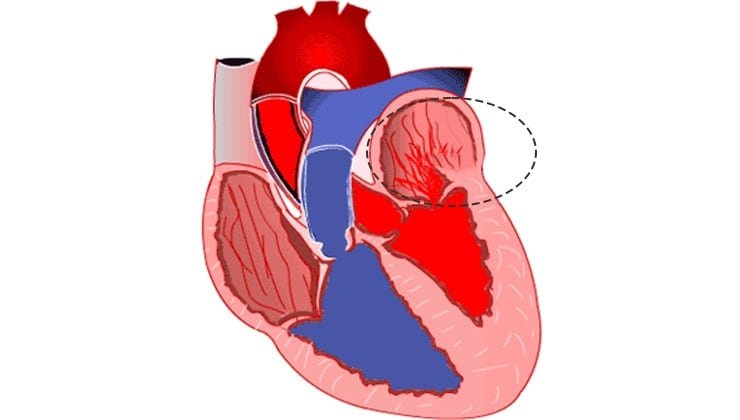Mitral valve regurgitation, the most common type of heart valve disease. It arises when the mitral valve, which connects the left atrium and left ventricle of the heart, fails to close completely. This flaw causes blood to flow backward into the left atrium instead of regularly passing through the heart and into the rest of the body.
When the regurgitation is severe, there is insufficient blood pumped out to suit the body’s needs. Individuals with severe mitral valve regurgitation may experience acute weariness and shortness of breath as a result of the heart’s reduced efficiency.
Types of Mitral regurgitation
There are two primary forms of mitral regurgitation:
Primary mitral regurgitation: In this condition, the fault is with the valve itself. Structural damage to one or more valve components prevents it from closing normally. For example, the valve leaflets could become too flexible to produce a secure seal or too rigid to close.
Secondary mitral regurgitation: In this scenario, the issue is cardiac disease affecting the chambers of the heart that support the valve (the left atrium or ventricle).
Causes of Mitral regurgitation
The causes of Mitral Regurgitation include:
- Heart attack or coronary artery disease: These can injure the heart muscles surrounding the mitral valve.
- Cardiomyopathy: It is a condition in which the heart walls stretch, thicken, or stiffen.
- Congenital Heart Disease: Birth abnormalities affecting the heart
- Untreated high blood pressure: Can cause the muscle ring around the valve to expand over time.
- Mitral valve prolapse: It is a common heart defect in which the valve flaps expand into the left atrium during heart contraction.
- Damaged tissue cords: These secure the flaps of the mitral valve.
- Rheumatic fever: Rare consequence of strep throat, can damage the mitral valve.
- Endocarditis: It is an acute infection of the heart’s lining that may require antibiotics.
Symptoms of Mitral regurgitation
The following can be symptoms indicating Mitral regurgitation:
- Shortness of breath can become more severe during workout or when lying down.
- You might experience your heart beating or hammering, particularly when lying on your left side.
- Disrupted blood flow may cause swelling in your hands, feet, ankles, abdomen, or legs.
- You may feel fatigued or weak, particularly with physical exercise.
- Coughing can create dry or bloody mucus.
- Chest pain might spread to the neck, jaw, or shoulders.
- Irregular heartbeat also known as an arrhythmia.
- Sound of blood flow also known as a heart murmur.
- Possible symptoms include dizziness, fainting, and anxiety.
Complications
Mitral Regurgitation can lead to some complications including:
Heart failure: A leaking mitral valve causes the heart to work harder to pump blood. It can lead to heart failure and associated symptoms such as shortness of breath.
Atrial fibrillation: This uneven and frequently fast heartbeat is a common cardiac rhythm problem that can be caused by mitral valve regurgitation. Atrial fibrillation increases the risk of blood clots and strokes.
Pulmonary hypertension: This is high blood pressure in the lungs caused by pressure from the heart’s left chambers being passed backward.
Dilation of the heart: Cardiomegaly can occur when the left lower chamber of the heart widens due to increased blood pumping.
Diagnosis
A medical professional can diagnose mitral valve regurgitation (MR) by listening to the heart with a stethoscope and detecting a heart murmur. The murmur is created by unpredictable blood that flows backwards via the mitral valve.
Other diagnostic technique that can be used:
Echocardiogram: It is a crucial diagnostic test for MR, which reveals the structure of the mitral valve and blood flow in the heart. A typical echocardiogram, known as a transthoracic echocardiography (TTE), can confirm a diagnosis and assess the severity of the problem.
Chest X-Ray: Cardiomegaly is seen in patients with chronic MR due to enlargement of the left atrium or right side of the heart.
Cardiac MRI: It uses magnetic fields and radio waves to provide comprehensive images of the heart, which can be used to evaluate the severity of MR.
Stress test: Monitors blood pressure, heart rate, and cardiac rhythm as the patient walks on a treadmill or rides a stationary cycle. When a patient is unable to exercise, medications might be utilized to stress the heart.
Treatment of Mitral Regurgitation
Treatment options for mitral regurgitation vary according to the severity of the problem and the existence of symptoms.
- Medications: These may be recommended to reduce symptoms, regulate abnormal heart rhythms, and avoid problems.
- Open surgery: It is often recommended for severe cases of mitral regurgitation. Options include mitral valve repair, which tries to restore the valve’s function without removing it. Mitral valve replacement can be done with a mechanical or biological valve.
- Minimally Invasive Mitral Valve Surgery (MICS): Some patients may be eligible for minimally invasive methods, which are less invasive than typical open heart surgery.
- Cox Maze 4 procedure: Dr.Nikhil says, “Cox Maze IV should be added to mitral valve replacement in the presence of atrial fibrillation, but is frequently omitted by surgeons!”.
- Incisionless or Transcatheter mitral valve repair (e.g., the MitraClip procedure): TMVR can be done. Dr.Nikhil says, “This is an expensive treatment that works only in well selected patients!”. TMVR involves replacing the mitral valve using a catheter inserted through a blood vessel, typically in the groin.
TMVR should only be done in patients with previous bioprosthetic mitral valve replacement.
Dr. Nikhil
The choice of treatment depends on the patient’s overall health, the cause and severity of the regurgitation, and other individual factors.
Patients with mitral regurgitation should have regular follow-ups to monitor their health and decide the best treatment option. Early detection and effective therapy can assist to avoid problems while improving quality of life.
Schedule your consultation today for TAVR/TMVR and other treatments for Cardiac care at Heart360 Care. Our expert Dr. Nikhil P.J.Theckumparampil is a Gold medalist in MBBS with 17 years of experience in the U.S.









